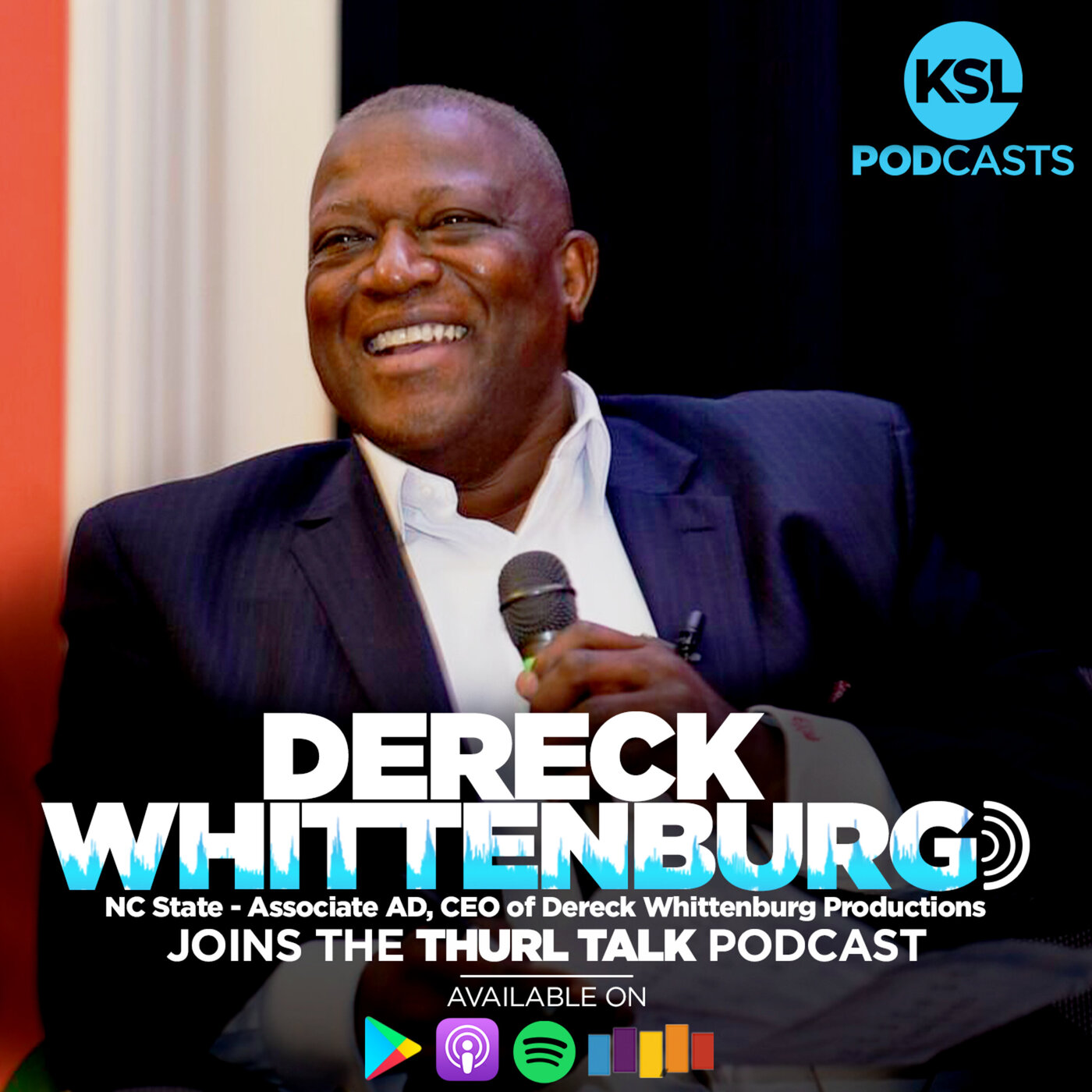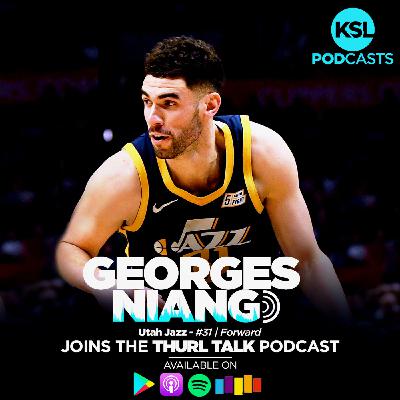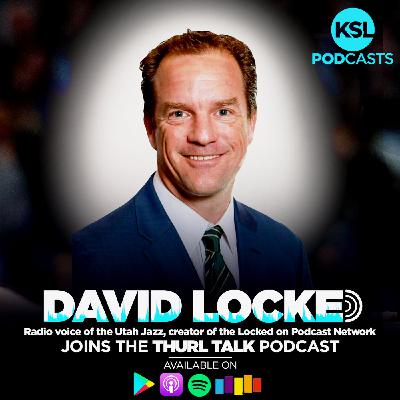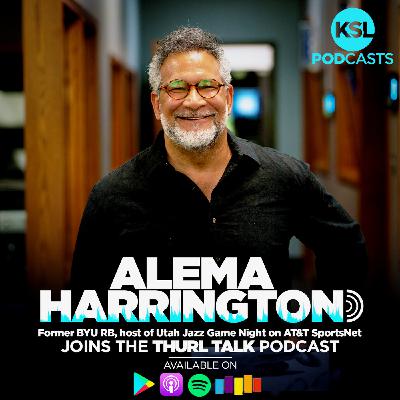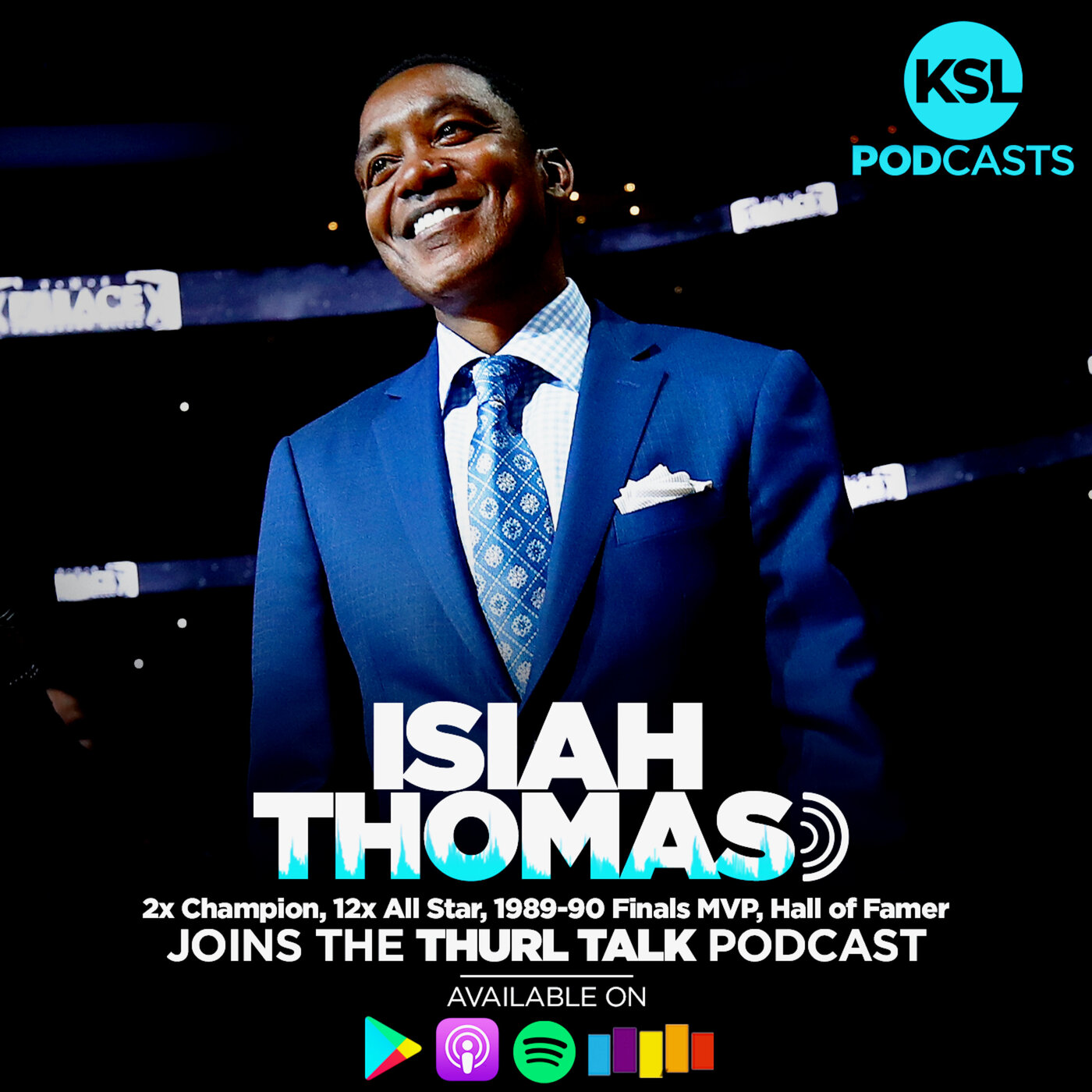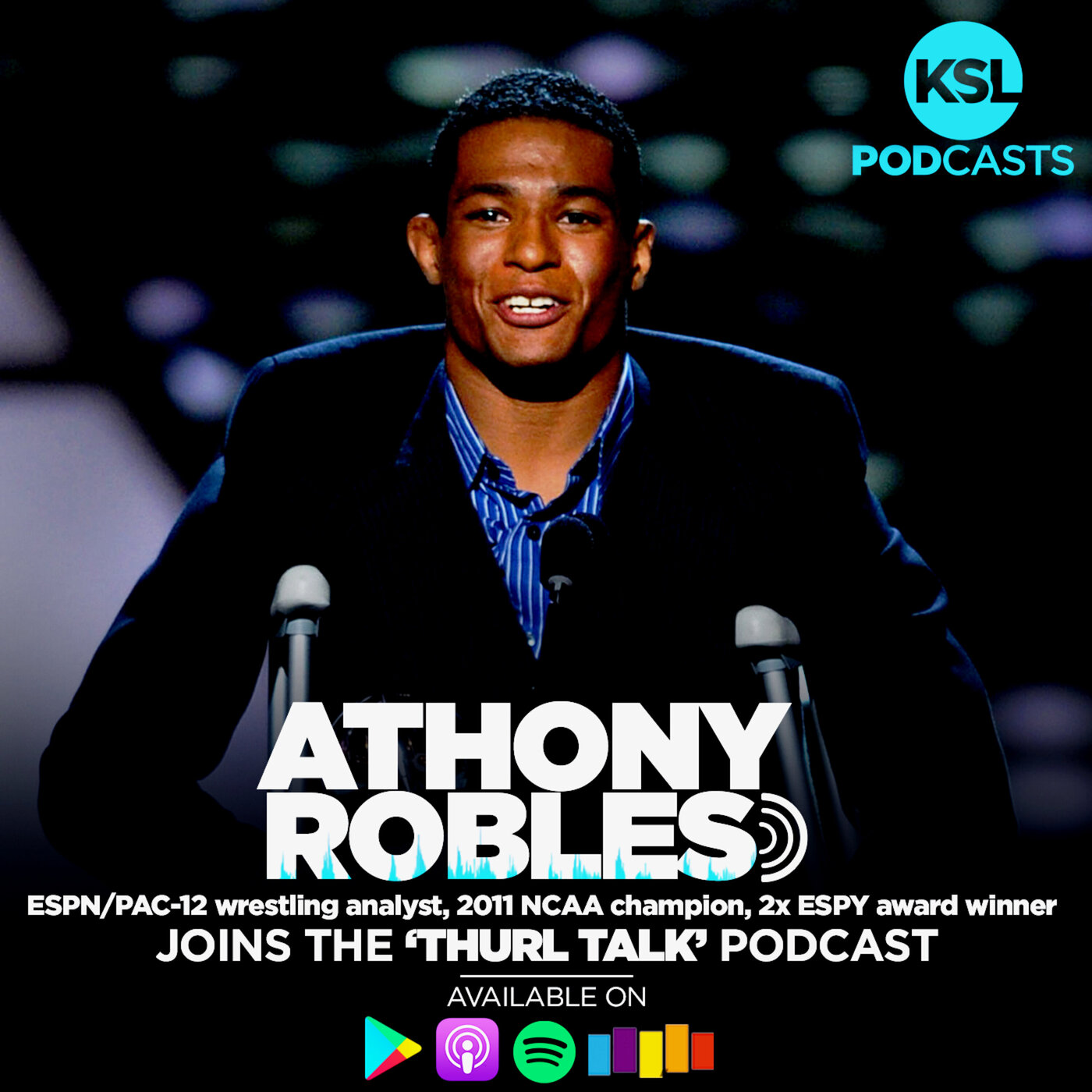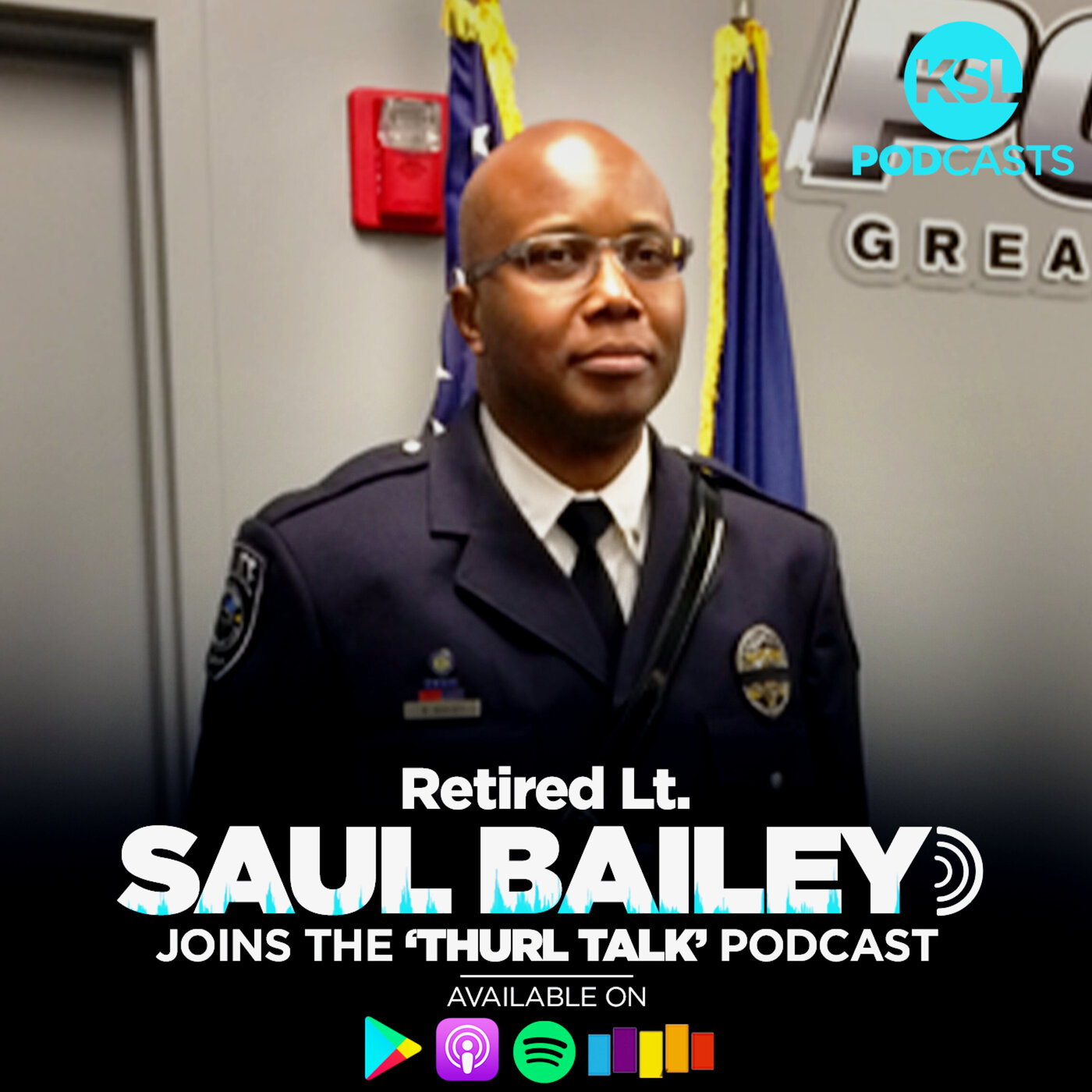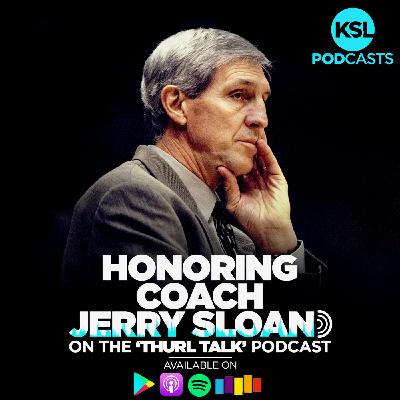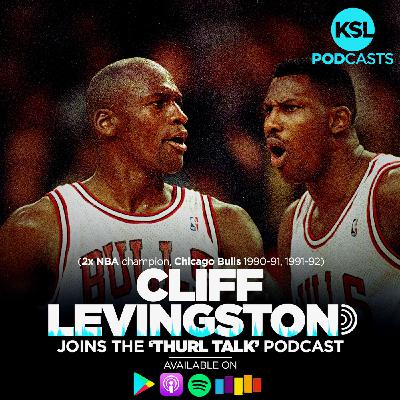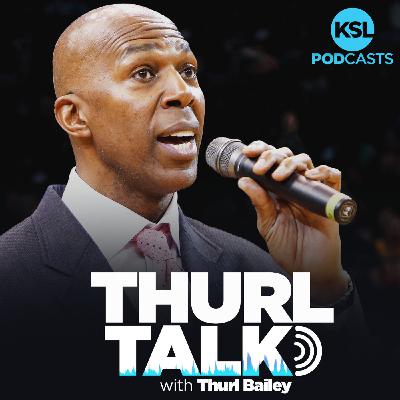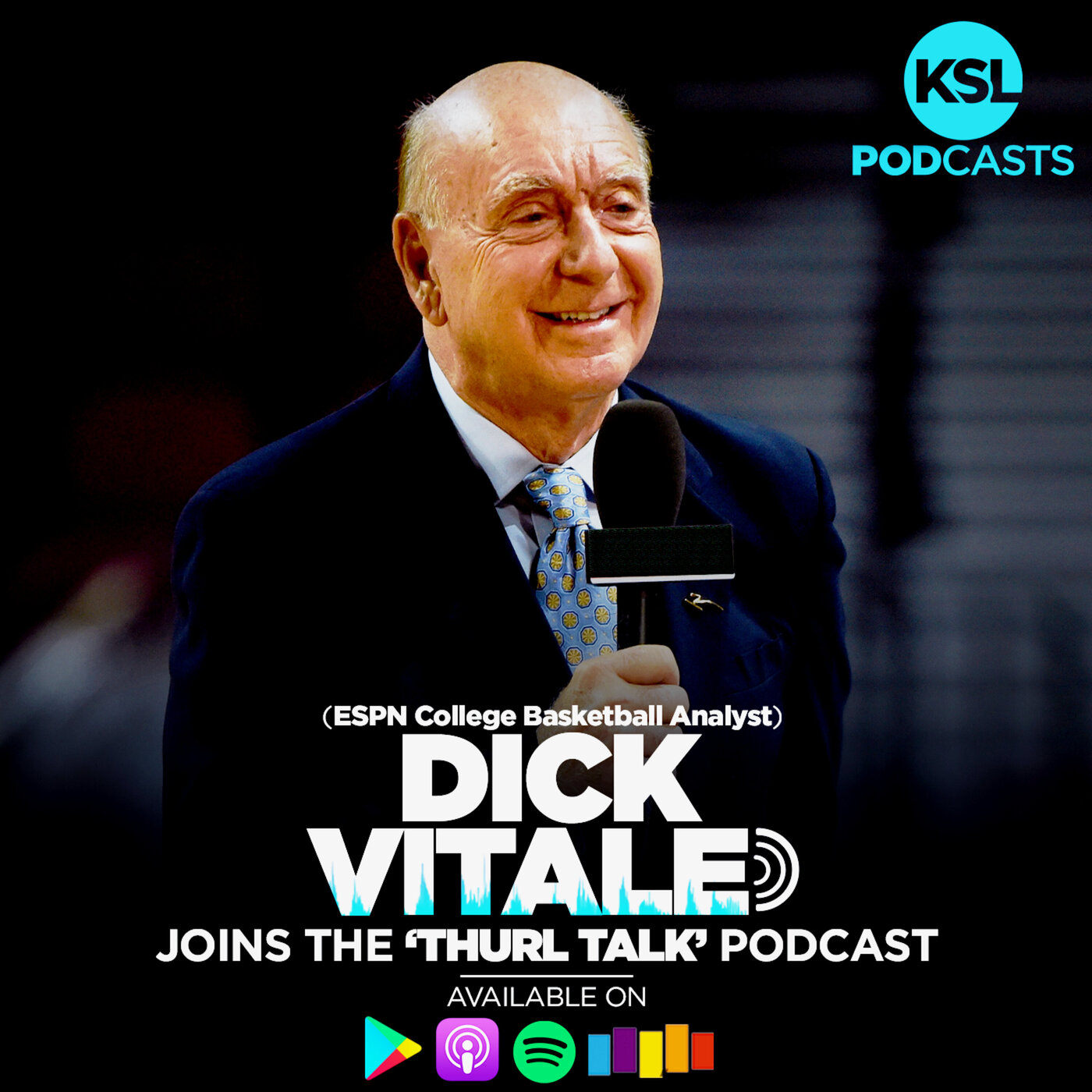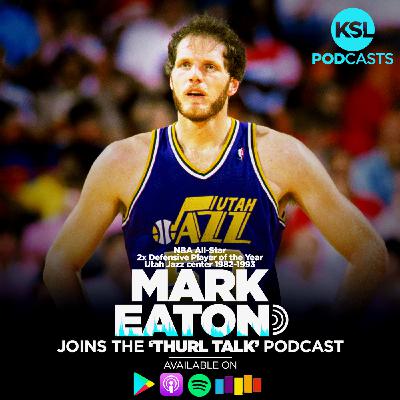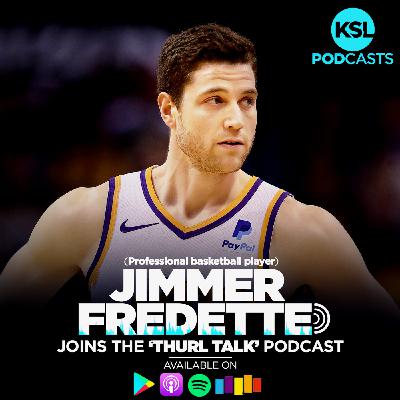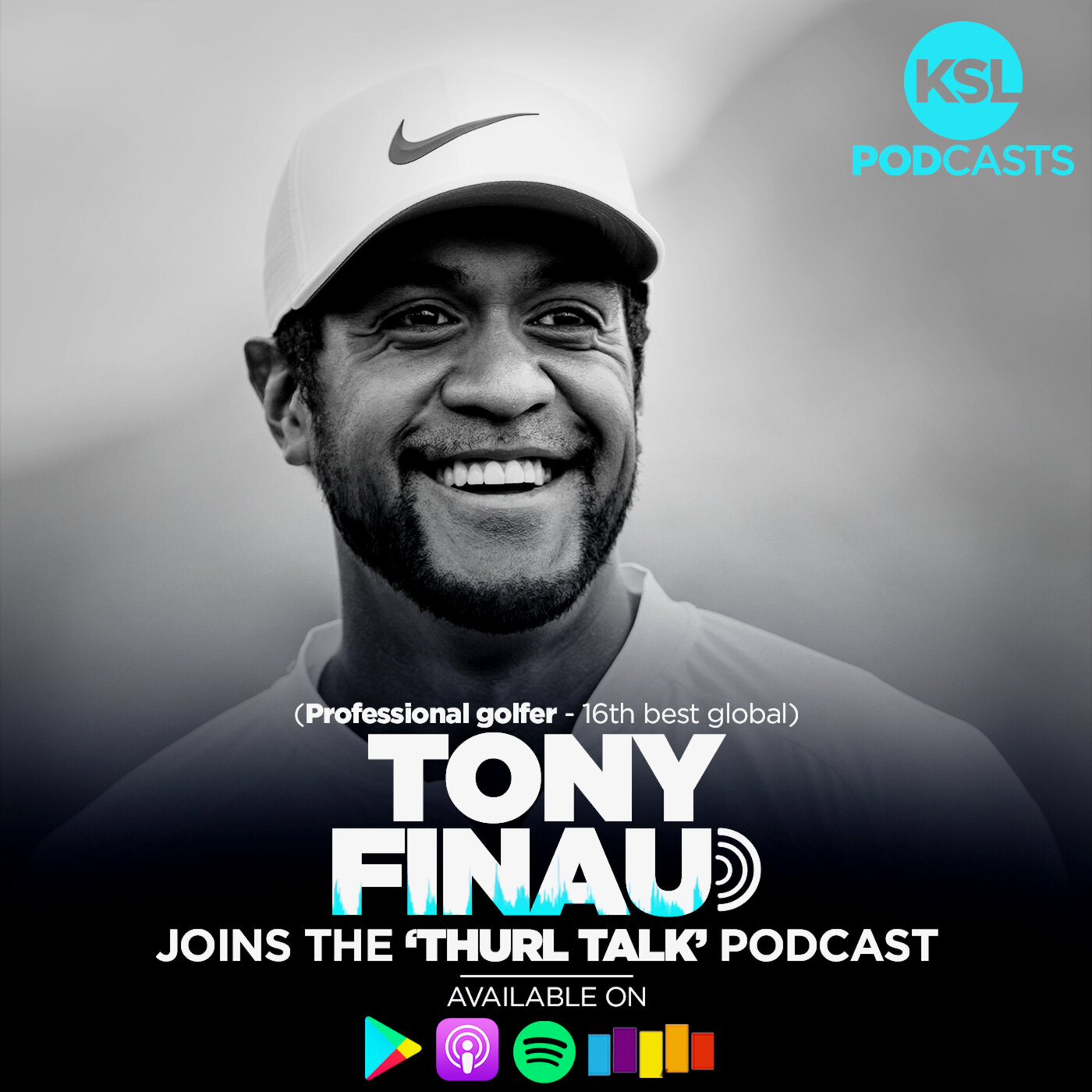Discover Thurl Talk
Thurl Talk

Thurl Talk
Author: KSL Podcasts
Subscribed: 31Played: 419Subscribe
Share
© 2023 KSL Podcasts
Description
Thurl Bailey has stories to tell. After more than a decade playing in the NBA as Big T for the Utah Jazz and Minnesota Timberwolves, Thurl has seen a thing or two. And he still has things he wants to learn. He's a musician, father, husband and friend and he's interested in talking with people. That's what he'll do each week on Thurl Talk: share his own life experiences and learn from the stories of others. Whether it's about his life on the court, behind a mic or sitting at the kitchen counter, count on getting to know the real Thurl Bailey and maybe learn a little something from his friends. Photo credit: Jeffrey D. Allred, Deseret News
25 Episodes
Reverse
In this week's episode, we remember and honor the late, great former Utah Jazz legend, Mark Eaton. We're joined by some of his former teammates as well as a few of his opponents to remember his impact on the game, how some of his greatest traits translated into life after basketball, and some of our fondest memories of the big fella'.
Our list of today's guests include:
Adrian Dantley (NBA Hall of Famer, Utah Jazz 1979-86)Eddie Johnson (Phoenix Suns analyst, 17-year NBA veteran)Bobby Hansen ('92 NBA champion, Utah Jazz 1983-90, Iowa Hawkeyes radio commentator)Darrell Griffith (Utah Jazz 1980-91)John Stockton (NBA Hall of Famer, Utah Jazz 1984-03)
See our website for privacy information.
In this week's episode, Thurl Bailey is joined by Walter Bond (Business Coach/Keynote Speaker/Trainer/former NBA Player) to talk about growing up in Chicago in an "education first" household, why education was so important to Walter's parents, and the moment he realized he needed to choose between baseball and basketball.
Then he opens up about coming up with the concept for his book, "Swim!", the symbiotic relationship between the suckerfish and the shark, and how focus and mentorship are so impactful in the business world.
Walter also talks about why leadership and culture can be such a game-changing value within a company.See our website for privacy information.
Thurl Bailey is joined by Dereck Whittenburg (NC State - Associate AD, CEO of Dereck Whittenburg Productions) to talk about how NC State was always his first choice when contemplating which college he wanted to play for, his introduction to coach Jim Valvano, and why Jimmy V wasn't immediately accepted by his peers because he wasn't a "traditional" coach.
Dereck then talks about his inspiration behind pushing for and eventually executive producing the 30 for 30 doc, "SURVIVE AND ADVANCE" detailing NC State's 1983 title run.
He also explains why he gravitated towards coaching and ultimately decided to commit to being an assistant and head coach throughout the years.
We also dive into the statistics behind DI-DIII athletes that believe that they might go on to play professional sports, why many college athletes need to understand that there are so many successful opportunities outside of professional sports, and why it's important to empower others when they're on their own journey.
Lastly, Dereck talks about his decision to go back to NC State and why he is so passionate about helping others.
You can learn more about Dereck and the work he's doing helping others by visiting his website: https://www.dereckwhittenburg.com/See our website for privacy information.
Thurl Bailey is joined by Georges Niang (Utah Jazz - Forward | #31) to talk about learning from the loss to the Denver Nuggets in game 7 of the NBA playoffs, the pros and cons of playing without fans in the building, and how to get through shooting slumps.
Georges also talks about the importance of understanding your role, trusting your teammates, and the impact the players have had on social justice in the bubble.
Then we dive into Georges growing up in Massachusetts, the strong relationship he has with both of his parents, how perseverance led him to the NBA, and why he wished he would have dreamt bigger than just making it to the NBA.
Georges also opens up about how important work ethic is, overcoming challenges while coming up through college, his podcast, "Drive and Dish", and his passion for broadcasting.See our website for privacy information.
Thurl Bailey is joined by Stedman Graham (Author, Educator, & Entrepreneur) to talk about life during the pandemic, the importance of having a routine, and working on yourself during the COVID-19 outbreak.
Then we talk about the social unrest in society today, getting rid of the labels that hold us back, and ways to leverage your branding in the confines of today's era.
Stedman also takes us back to growing up in Whitesboro, New Jersey, why he was so angry during his childhood, his search for equality, and how he was able to get out of his small town with the help of basketball. He also talks about how his relationship with Oprah helped taught him how to think more clearly.
Stedman also talks about why you need to be betting on yourself immediately to adapt to the 21st century and why you need to find what you're passionate about to keep up with all of the changes that are taking place today.
To learn more about Stedman Graham or buy his latest book, you can visit: www.stedmangraham.comSee our website for privacy information.
Thurl Bailey is joined by David Locke (Radio play-by-play voice of the Utah Jazz, creator of the Locked on Podcast Network) to talk about how COVID-19 has changed his daily life, predicting the NBA's return, and the importance of laying the groundwork for next year's season.
We also dive into how the major sports are all handling the pandemic differently, why David believes that the live in-person experience will be reserved for specific people, and how revenue will bounce back quicker than we realize.
David also explains why the Utah Jazz are ahead of the curve in relation to other teams coming back, how the team is going to have to adapt without Bojan Bogdanović, and a potential shift in the team's dynamic.
Later, David explains the challenges he faced after following "Hot Rod" Hundley, finding his own voice, and how he had to shut off social media to focus due to the criticism he received.
Lastly, we talk about the importance of working on your craft and what it means to be a professional broadcaster in the NBA.
You can learn more about David by visiting https://www.lockedonjazz.net/.See our website for privacy information.
Thurl Bailey is joined by Alema Harrington (Former BYU RB, host of the Utah Jazz Game Night on AT&T SportsNet) to talk about living through the COVID-19 pandemic, the announcement of Rudy Gobert testing positive for the virus, and how Alema has been able to use tools that he's learned in addiction recovery to stay balanced during the pandemic.
We also dive into Alema's childhood growing up in Hawaii with his twin brother and how it shaped his life. Then we talk about his experience growing up playing football and moving to Utah to play football for BYU.
Alema also talks about the feelings he had when he would struggle during his time playing football at BYU and how he was introduced to alcohol and pain killers after getting injured.
Lastly, Alema touches on his rock bottom and how he has been able to use his recovery to help others who are struggling with their own substance abuse disorders.See our website for privacy information.
Thurl Bailey is joined by Isiah Thomas (2x Champion, 12x All-Star, 1989-900 Finals MVP, Hall of Famer, NBATV host) to talk about how the current state of our society is reminiscent of the civil unrest that took place in the 1960s and how we still have so much more work to do.
We also dive into 'The Last Dance' to talk about Isiah's experience playing against the 1990s Bulls and what it was like to see the behind-the-scenes issues that the Bulls went through during their historic run. He also explains how he was shocked by Michael Jordan's feelings towards him and the Detroit Pistons during the '90s.
Then Isiah recalls what it was like growing up on the west side of Chicago with six brothers and two sisters and how he learned the values of the game at an early age. Furthermore, Isiah recalls how excelling as a player helped him become a better team player, committing to Indiana University, and the differences between the modern game to the '80s & '90s.
Lastly, we talk about Isiah's biggest accomplishments in basketball and life.See our website for privacy information.
Thurl Bailey is joined by Anthony Robles (ESPN/PAC-12 wrestling analyst, 2011 NCAA wrestling champion, 2x ESPY award winner, NIKE athlete, and author) to talk about the struggles he faced growing up without his right leg, being treated differently as a child, and the importance of having a great support system growing up.
Then Anthony talks about how a push-up contest led him to find his competitive drive and how his cousin helped him find a passion for wrestling. We also talk about the challenges he faced once Anthony committed to a life of wrestling, how he had to innovate to adapt to the sport, and the misconceptions he faced once he started to win.
We then discuss Anthony's book, Unstoppable: From Underdog to Undefeated - How I Became a Champion, the film that is being produced about his life, and the message of being unstoppable.
Lastly, we talk about the racial injustices that are taking place throughout the world and how it offers the opportunity to embrace each other, to have empathy for one another, and how we can be better as a country.See our website for privacy information.
Thurl Bailey is joined by Saul Bailey (retired Lt.) to talk about his experiences of dealing with discrimination at a young age and how it shaped him as a young man, as well as the importance of helping your community and how it ultimately led to him to becoming a police officer.
We also dive into how being exposed to all levels of diversity at a young age helped Saul have a better understanding of those around him that aided him throughout his entire career.
Lastly, we touch on how to fix relations between police and our communities but how to look deeper into the rifts that have been causing systematic issues all throughout history and how we can always do better.See our website for privacy information.
Thurl Bailey is joined by Julius "Dr. J" Erving (NBA Hall of Famer, 1982-'83 NBA Champion, 3x ABA MVP, 1981 NBA MVP) to talk about his book, Dr. J: The Autobiography, the racial tensions he experienced growing up, why he's always been a follower of rules and how he used that to his advantage in sports at an early age.
Then he dives into what it was like playing basketball on his Salvation Army team, how his high school coach, Ray Wilson, was his idol growing up, and the way Elgin Baylor shaped Julius's game growing up.
We also talk about the evolution of Julius's game from his time spent in the ABA, how it transitioned into the NBA, and what he learned by sacrificing for the 76ers during their championship run in 1983.
Lastly, we discuss how guards have taken the spotlight from the historically dominant centers, the movement from athlete to non-athlete, the importance of planning for life after basketball, and what will it take for the NBA to return.See our website for privacy information.
Thurl Bailey is joined by Natalie Williams (WNBA Hall of Famer, 4x WNBA All-Star, 3x All-WNBA First Team, 2x All-ABL First Team) to talk about how getting a later start in basketball, choosing to go to school on a volleyball scholarship, and how she ultimately led to choosing basketball over volleyball after being cut from the 1996 Olympic volleyball team.
Then we dive into her experience winning the Gold medal in the 2000 Summer Olympics, getting drafted by the Utah Starzz, the inequalities between the NBA and the WNBA, and why female professional basketball players are forced to play overseas during the offseason.
Lastly, Natalie describes the pride she has for coaching young women, how important motherhood has been in her life, and the hurdles the WNBA has to address before returning to play.
To learn more about Natalie Williams and her work as a coach, visit: https://www.nataliewilliamsbasketballacademy.com/See our website for privacy information.
In this week's episode, Thurl Bailey honors Basketball Hall of Fame coach, Jerry Sloan.
Thurl recalls what he learned from the late coach, how coach Sloan helped him grow as an NBA player, and how he helped prepare Thurl for the business side of the league.
We also dive into why coach Sloan was so well respected by all of his players and how his drive to be great helped motivate his players throughout his tenure as the Utah Jazz head coach.See our website for privacy information.
Thurl Bailey is joined by Cliff Levingston (2x NBA champion, Chicago Bulls 1990-91, 1991-92) to talk about growing up in San Diego, CA., how his first passion was baseball, and what drove him to get out of California.
Cliff also recalls being drafted 9th in the first round to the Detroit Pistons, even though he never thought he was good enough to play in the NBA. Then we talk about how being traded to the Atlanta Hawks was exactly what Cliff needed to find his footing in the NBA.
Lastly, Cliff recalls his time with the Chicago Bulls and how Michael Jordan's competitiveness divided the early 90s team. Then we dive into how his job on the Bulls was to beat up Scottie Pippen during practice, the euphoric feeling of winning a championship, and the lessons he learned from the team that he lives with every day.
You can learn more about Cliff's foundation, Legends Leaving Legacies, by clicking the link below:https://www.facebook.com/Legends501c3/See our website for privacy information.
This week we're switching things up a little bit. Thurl Bailey takes us on a musical journey in the hopes of healing any pain we might be feeling during the pandemic.
Thurl talks about some of his favorite cover songs that he's recorded, from Bill Withers to Harry Chapin, the original tracks that Thurl is the proudest of, and how the message and power of music can help get us through these hard times.
TRACKLIST:It’s Gonna Be Alright - 4:08Ain’t No Sunshine - 8:19My Love - 13:25Not Giving Up On Love Duet with Christine Gordon - 17:23Here Comes My Love duet with Jolsyn Petty - 21:42What You Won’t Do For Love - 25:47Love Saved The Day (Duet with Billy Dean) - 30:50Let There Be Peace On Earth - 37:07Every Mind - 41:45Cat’s In The Cradle - 46:16Lovely Day - 50:27
You can find Thurl's entire collection of music on Apple music.See our website for privacy information.
Thurl Bailey is joined by Dick Vitale (ESPN College Basketball Analyst) to talk about how coaching a baseball team in Rutherford, NJ ultimately led to him coaching for the Detroit Pistons in the NBA.
Then we dive into his time in Detroit, his love for college hoops, and why the traditional big man is a lost art.
Dick also talks about why the one-time transfer rule is going to cause chaos for the NCAA and why players should be able to skip college and go straight to the NBA.
Lastly, we remember the late, great Jim Valvano and how his impact can still be felt decades after succumbing to cancer on April 28, 1993.
You can donate to the V Foundation for Cancer Research by clicking the link below:https://bit.ly/35iF8ez
See our website for privacy information.
Thurl Bailey is joined by Mark Eaton (Utah Jazz center 1982-1993, NBA All-Star, 2x Defensive Player of the Year) to talk about his story of working as a mechanic before getting picked up by the Utah Jazz on a one-year contract and the power of persistence.
Then we talk about Mark's latest book, The Four Commitments of a Winning Team, the importance of knowing your role, focusing on your strengths, doing what you're asked to do, and the bond you build when protecting others.
See our website for privacy information.
Thurl Bailey is joined by Jimmer Fredette (professional basketball player) to talk about how COVID-19 has shaped international basketball, growing up in Glen Falls, NY, and the benefits of growing up in an athletic and competitive family.
Then we talk about how Jimmer's early game was refined in 3-on-3 games across New York, his decision to attend BYU after not getting heavily recruited, and the power of setting a goal.
We also dive into Jimmer's time at BYU and how his approach towards practice set him up for success throughout his college career.
Jimmer then describes how a great game against San Diego State changed his life, his early struggles with the Sacramento Kings, and what Jimmer learned from his time playing in China.
Lastly, we talk about the level of competition in the EuroLeague and some of his goals in his basketball and post-basketball career.See our website for privacy information.
Thurl Bailey is joined by Tony Finau (professional golfer) to talk about how his life has changed since COVID-19 has taken over the sports world, how he's spending his time since the outbreak, and his true love for basketball.
Then we talk about his passion for golfing stemmed from his younger brother and father, how he always knew he wanted to be on the PGA tour, and what it was like winning a national tournament as a twelve-year-old.
We also dive into some of the hurdles Tony's family had to overcome to while navigating the sport, deciding whether to participate in a $2 million tournament or commit to BYU, and how Lee Trevino set Tony up to succeed as a professional golfer.
Tony then recalls how he was able to move on from the death of his mother, what being a husband and father means to him, and the philanthropic efforts he's been able to do with his foundation, the "Tony Finau Foundation".
Lastly, we talk about Tony's goal of becoming the best golfer in the world and what it was like to play with Tiger Woods.See our website for privacy information.
Thurl Bailey is joined by Ranger Brody Young (Utah State Park Ranger) to talk about how his love for the outdoors led him to become a ranger and how a routine patrol at Poison Spider trailhead changed his life forever after being shot nine times on November 19, 2010.
Ranger Young describes the gunfight that took place that night, his will to stay alive while thinking of his wife and kids, and how he was able to call for help after falling unconscious thanks to years of training.
Then we talk about his experience with getting help from all of his coworkers, the recovery process he had to go through to get back to work, and what gets him through when he retells his amazing journey.
We then dive into ranger Young's assailant, Lance Leeroy Arellano, why he would do such a thing, and how two local boys found Arellano's body five years later.
Lastly, Ranger Young talks about his work as a motivational speaker and his message that he hopes can help a lot of people.
See our website for privacy information.




